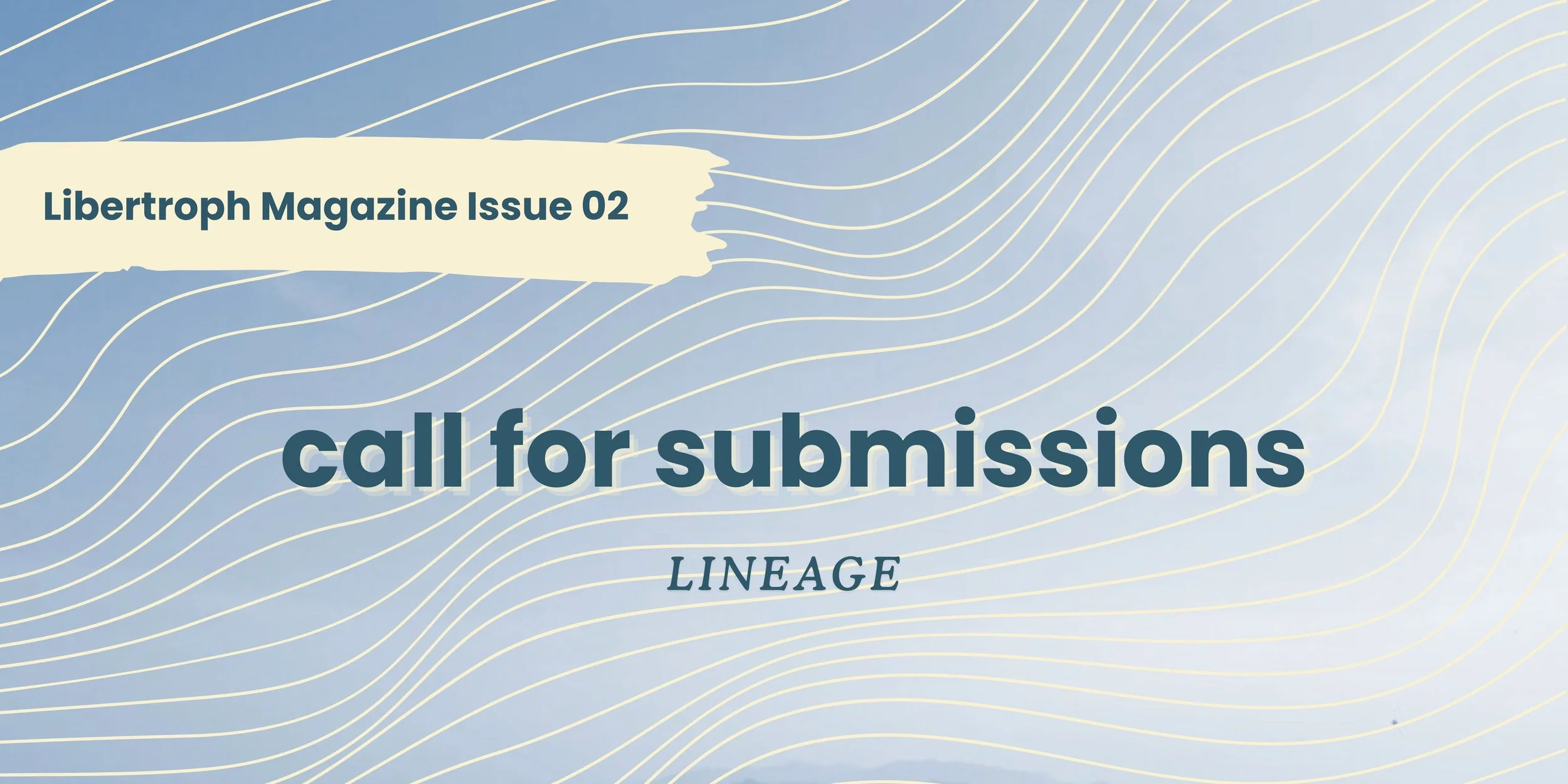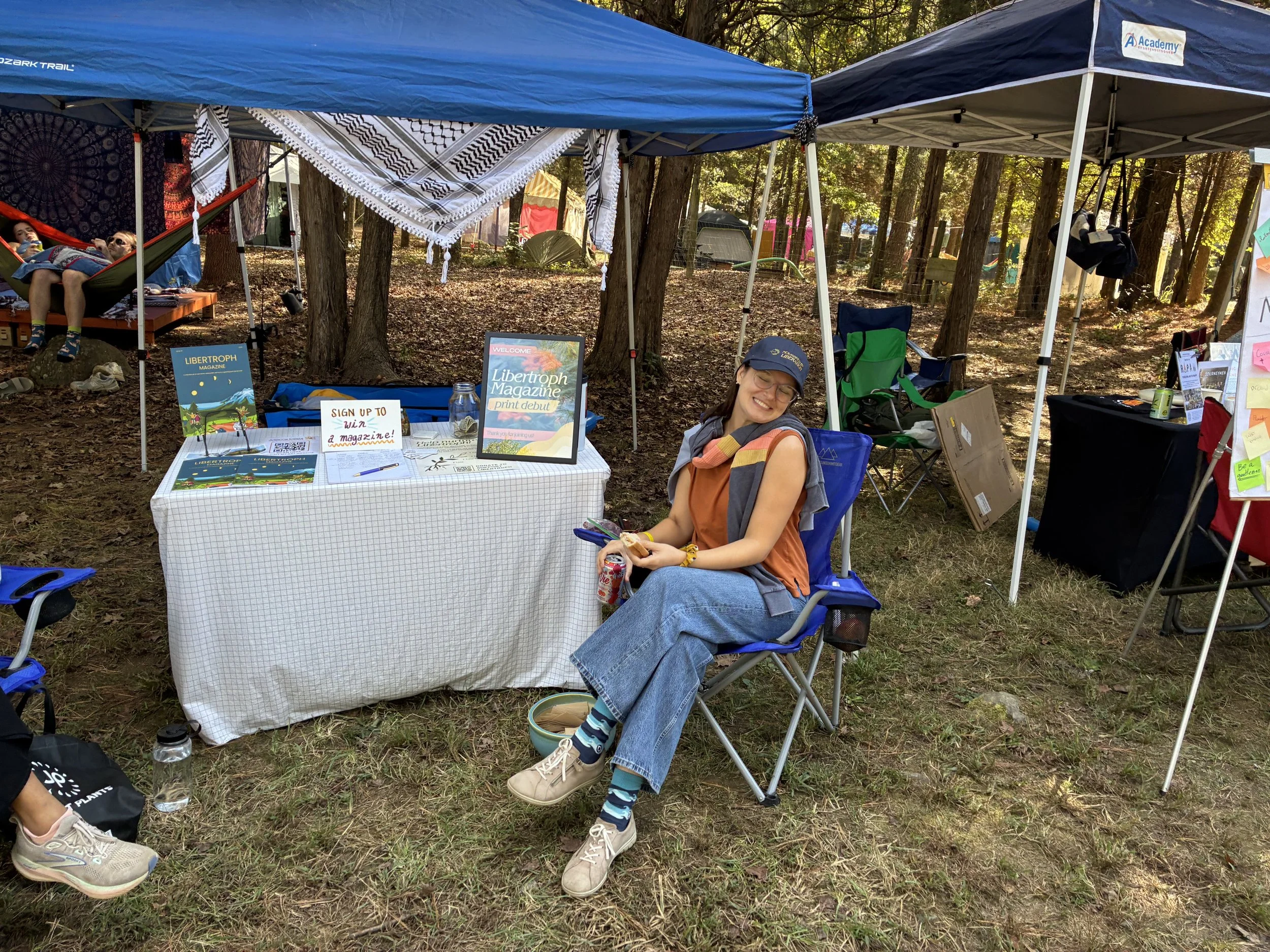Gratitude & Open Call for Issue 02
Libertroph Magazine Issue 01 has been traversing the world in print form for nearly two months now. As we share it at events and in community, we continue to affirm that the stories of white anti-racist organizers are worth telling. Our art, resources, and stories are helping us co-create white anti-racist culture.
Each gathering, question, and conversation about Libertroph also continues to reveal more and more histories of white folks who have chosen to take up the life-giving work of anti-racist organizing.
In service of continuing to uplift these models, we are excited to share the call for submissions for Libertroph Issue 02 is OPEN!
We invite you to join us in an exploration of Lineage and its many meanings as they relate to white anti-racist organizing. You can check out the complete call for submissions here.
For four days in mid-October, I sat in a lawn chair beside a table with print copies of Libertroph Magazine Issue 01. “Would you like some wildflower seeds?” I asked passersby repeatedly. As I handed them southern native seed packets, I shared a bit about Libertroph. “It’s an arts and culture magazine about how white people have and can grow racial justice movements.”
The passersby were attending the Shakori Hills Grassroots Music and Dance Festival. I was among upwards of 9,000 people who gathered to camp, commune, sing, and dance together outside. Many folks return year after year to the site of the biannual festival, an intergenerational live music extravaganza.
Shakori Hills rests on the ancestral homelands of the Eno, Tutelo, Saponi, and Shakori peoples, in the state presently known as North Carolina.
North Carolina, the state that facilitated much of my own racial awakening when I lived there as a student. North Carolina, whose land, people, and culture raised my dearest friends. Whose history of racial violence and activism pushed my own understanding of how I might find a home in this movement.
Upon this return, I felt honored to share Libertroph and moved to be received with openness and warmth by the folks I spoke with.
Adults learning about Libertroph reacted with raised eyebrows and a slow smile. Children: magazine already in eager hands, flipped through the 60+ pages.
Many people paused to ask questions: Does this magazine share how to talk about racism with your family? Does it talk about the South? Where are you based? What does anti-racist organizing mean? What was the first time you noticed racism in yourself? How did slavery and racism even come to be?
Some people just sat quietly to read Libertroph in the lawn chair beside me before continuing on their way.
Many shared stories. Stories about how they’ve lost or severed relationships with loved ones because of racism and politics. Stories of how they’ve fought for their and their partners’ dignity in interracial relationships. About how they felt the first time they were called in. How conflicting “the South will rise again” and race-neutral narratives coexist. Patterns they notice in themselves, white friends, and how our liberation is bound up in the collective liberation of all people.
In time, we were seated in the grass, talking about mutual aid as a survival strategy after hurricanes, legacies of union millworkers, and reparations. Sometimes tears came, followed by long hugs.
A white child ran to and from their mother, asking how to spell her email so he may enter a raffle to win a copy of Libertroph Magazine. I grinned and pushed a copy into their hands. A gift. May the art spark imagination. May the words spark conversation with parents and loved ones.
May they seed a future of reckoning, repair, and relationship.
Image description: Julienne is seated in a lawn chair beside a table with a sign that announces Libertroph Magazine’s print debut, an invitation to sign up to win a magazine, and multiple magazines. A bowl of native wildflower seeds is by her feet and a keffiyeh hangs in the tent awning. Behind her are woods, tents, and folks in a hammock. She is smiling.
We hope to hear from you soon.
Julienne + Alyssa
P.S. Check out this interview with white antiracist elder, Margery Freeman, about undoing racism in Greensboro, North Carolina public schools.
Thanks to generous community members, the expenses for producing Libertroph Issue 01 are about 55% covered. If you could make a donation to help us cover costs before we start creating Issue 02, we would be so grateful.


